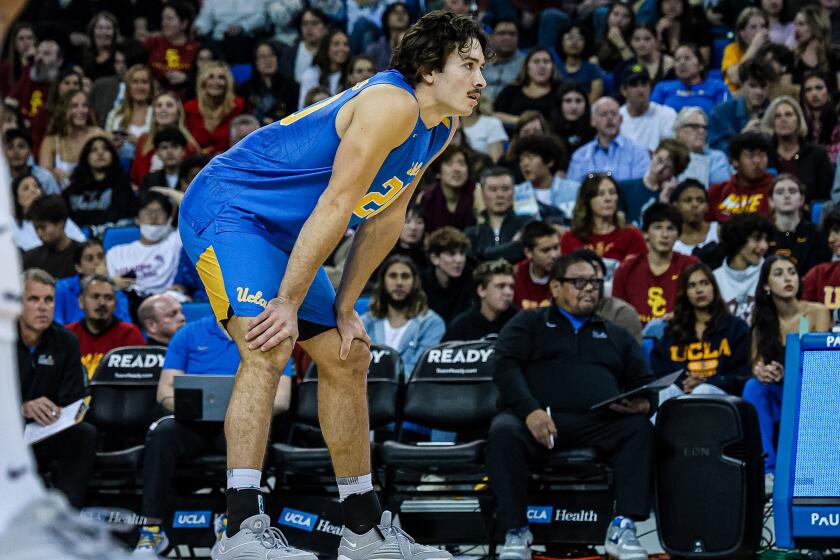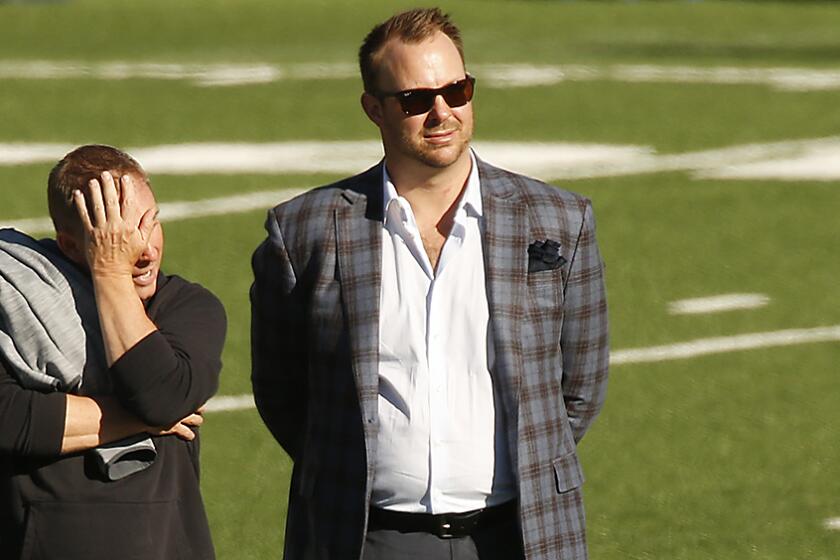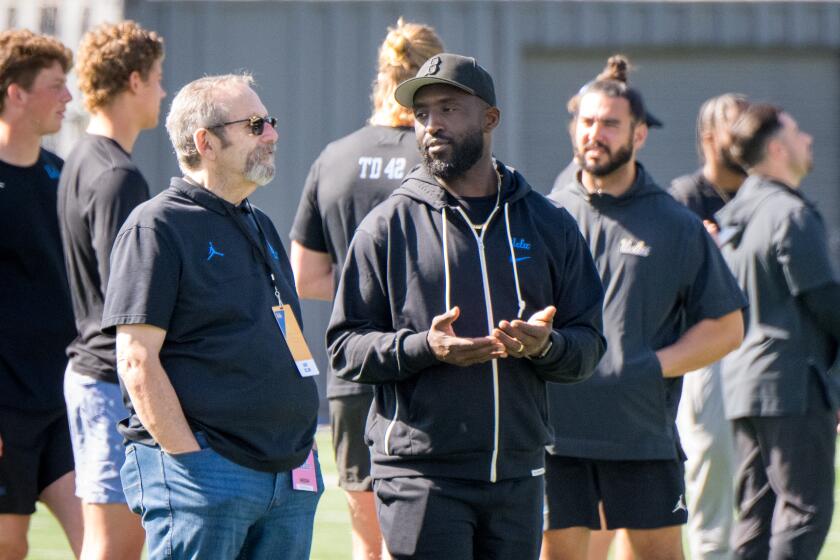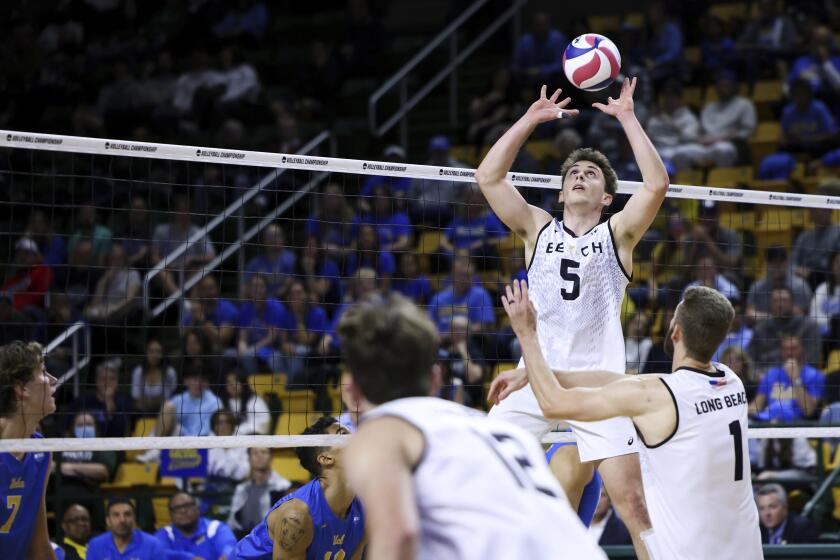They’re Not Too Good for Silicon Valley Game
Milliseconds before the high-tech boom went bust, someone thought launching the Silicon Valley Classic would be a good idea. Like an Internet stock worth a fraction of a cent, it has barely hung on for four years, more curiosity than opportunity.
Nevertheless, UCLA gratefully accepted an invitation to face de facto Silicon Valley home team Fresno State on Tuesday night in front of a small crowd expected to contain only a sprinkling of UCLA fans.
All of which raises a question.
Why bother?
Bruin players express the answer several ways, beginning numerically. As in, count the more than 100 days of practice, 200 days of conditioning and weight training, 5,000 or so helmet-to-helmet hits and maybe 10,000 wind sprints in the last year.
That’s a lot of work for 12 games. Add another, even one unadorned with Sugar, Rose, Orange or Fiesta, and it means a lot.
“A 13th is not something to treat lightly,” cornerback Matt Ware said. “It’s one more game, and the games are everything we work toward.”
A reason to play also can be conveyed sentimentally.
“You never really want it to end, you want to stay with your friends a little longer,” senior defensive end Dave Ball said. “I’m like Peter Pan. I don’t want to grow up.”
And it can be expressed emphatically.
“We’re not going to act like spoiled kids and say we don’t want to play in it,” quarterback Drew Olson said.
From the mouths of Bruins, it sounds so obvious. Football players want to play football.
Except that two years ago, UCLA had a different answer to the same question. The Bruins could have been invited to the Silicon Valley Classic merely by showing a little interest. And they were asked to play in the Humanitarian Bowl but said no.
Reasons to decline that made sense to an underachieving UCLA team in 2001 might be hard for this year’s Bruins to fathom.
Many of the players, especially the seniors, had no desire to continue the 2001 season. Several had visions of professional stardom -- not far-fetched considering six Bruins who were seniors in 2001 are in the NFL.
Also, the Bruins were emotionally whipped. A 6-0 start and No. 4 ranking had been torpedoed by the off-the-field transgressions of tailback DeShaun Foster and quarterback Cory Paus. UCLA had lost four in a row, defeated Arizona State in the regular-season finale and thought enough was enough.
The administration, especially Athletic Director Peter Dalis, didn’t like the math presented by Silicon Valley and Humanitarian officials. Dalis already had announced his retirement, effective the following June, and wished to leave the budget in the black.
The Humanitarian Bowl asked UCLA for a $350,000 fee for the privilege of playing, and the Silicon Valley Classic wanted UCLA to purchase 8,000 tickets. Dalis figured the school could turn around and sell 2,000 of them, max.
“When you combine those totals with other costs associated with a bowl, such as air transportation and housing and feeding of the players, we projected a loss of about $300,000,” Dalis said at the time, adding that the money would be better spent on the $11-million Acosta Center, for which ground was about to be broken.
Turning down a bowl opportunity was almost unheard of. There was criticism in some quarters, but others hailed the decision.
“Nobody turns something down like that, and I kind of liked it,” said Jim Muldoon, assistant commissioner of the Pacific 10 Conference. “It was a no-harm, no-foul type of thing.”
Dan Guerrero, who succeeded Dalis as athletic director, faced a similar question this year and arrived at a different conclusion: There’s no harm in playing.
The Silicon Valley Classic is affiliated with the Pac-10 now, making it financially palatable, the Bruins had three extra weeks of practice to digest first-year Coach Karl Dorrell’s intricate West Coast offense, and, well, as Silicon Valley publicist Heidi Peterson said: “They get to say they were in a bowl game.”
With Dorrell struggling to attract blue-chip recruits, every little bit helps. It’s a far cry from USC showing off the splendors of the Rose Bowl, but recruits visiting UCLA at least have been able to watch practices.
So the Bruins were pleased -- make that grateful beyond words -- that the Silicon Valley Classic chose them instead of Washington, which tied UCLA for sixth place in the conference.
“We want to send the seniors off on a positive note and help the young kids get more established in the system,” Dorrell said. “Everybody is getting excited about an opportunity to play.”
The payout to each team is only $575,000, the lowest of any bowl. UCLA’s expenses -- an amount set by the Pac-10 -- will eat up nearly all of it. Yet because the 10 conference teams split the payouts from the six bowl games affiliated with the Pac-10, UCLA neither gains nor loses money by playing.
The payouts from the Rose, Holiday, Sun, Insight, Las Vegas and Silicon Valley bowls total about $20 million, so after expenses each Pac-10 team gets something upward of $1.5 million.
But make no mistake, the Silicon Valley Classic is bargain-basement. It has struggled to survive without a title sponsor and received NCAA certification in November only after a letter of credit was underwritten by the city of San Jose and the San Jose Convention and Visitors Bureau.
The game is under new management. San Francisco marketing expert C. Jay Key is the executive director.
“The bowl was in financial difficulty, and they brought new people to save it,” Muldoon said. “We had grave reservations, but it appears to be out of the woods.”
UCLA is appreciative. The extra practice time has been the biggest bonus for a team that appeared confused by Dorrell’s scheme on offense all season. Younger players who had spent the regular season on the scout team have been integrated into the depth chart.
“It’s like having another spring practice, but this time there’s a game at the end,” senior receiver Ryan Smith said.
There is also the matter of a victory, which would nudge UCLA (6-6) over .500. Then, the Bruins not only can say they went to a bowl game, but also that they had a winning record.
At this point, they will take what they can get.
Said Olson: “We don’t strive to go to the Silicon Valley Bowl, but we want to win the football game.”
Go beyond the scoreboard
Get the latest on L.A.'s teams in the daily Sports Report newsletter.
You may occasionally receive promotional content from the Los Angeles Times.




